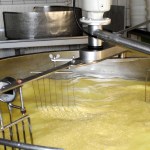
In a news article by the BBC: ‘China temporarily bans British cheese imports’ dated 5 May 2014, British cheese sales in China have received a temporary ban for cheeses made after 1 May.
Why?
Reportedly, Chinese food inspectors were dissatisfied with many aspects of one particular dairy, including maintenance, storage, transport and air sanitisation. Even though the report [cite]http://www.bbc.co.uk/news/business-27280986[/cite] highlights that the only diary in question does not export its products to China, the ban effects all producers. Even though China represents only 1% of UK cheese exports, the Chinese market is growing exponentially and to take advantage of that suppliers to China must demonstrate world class production hygiene standards and validation. A DEFRA spokesman responded that there was ‘no need for concern at all’, while the farming minister George Eustice MP described the ban as ‘disappointing’ stating that British cheese is ‘produced to the highest safety and quality standards’.
Since recent scandals in Chinese food safety, China has strengthened its foods safety requirements, requiring inspections of overseas suppliers. Chinese officials and the UK’s Food Standards Agency (FSA) are now working together to resolve the issue and will carry out inspections of all factories involved in the export of cheese to China.
What can be done?
There are many aspects of maintaining hygiene standards in dairy production. It’s not just the work surfaces, process and handling equipment that need cleaning, the air needs to be clean too [cite source=’pubmed’]8672271[/cite]
Air sterilisation should be performed, often with UV-sterilisation equipment supplied by companies such as UV Light Ltd and Steril-Aire. The air then needs to be tested to ensure the process is working using suitable bioaerosol sampling equipment.

The majority of dairies in the UK already undertake strict air sampling and surface swabbing to ensure their cleaning processes are working to the highest of standards. One of the largest markets for the MicroBio range of bioaerosol samplers is the dairy industry due to their low operating cost and ease of use.
With this Chinese action, it’s not just an issue for the UK. Dairies across the world need to be vigilant with regards to the tough Chinese hygiene standards and consider bioaerosol sampling in addition to their normal surface hygiene inspections. Research has shown that mould at air control points is of particular concern [cite source=’pubmed’]15135581[/cite]
